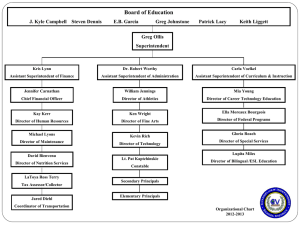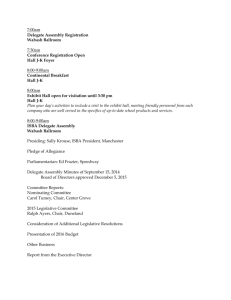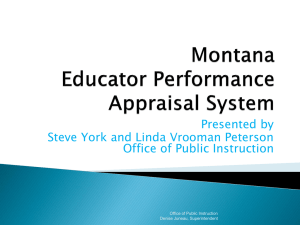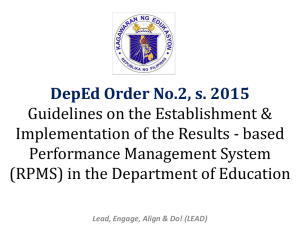Michael Adamson Supt Evaluation Process - Oct 10 2014
advertisement
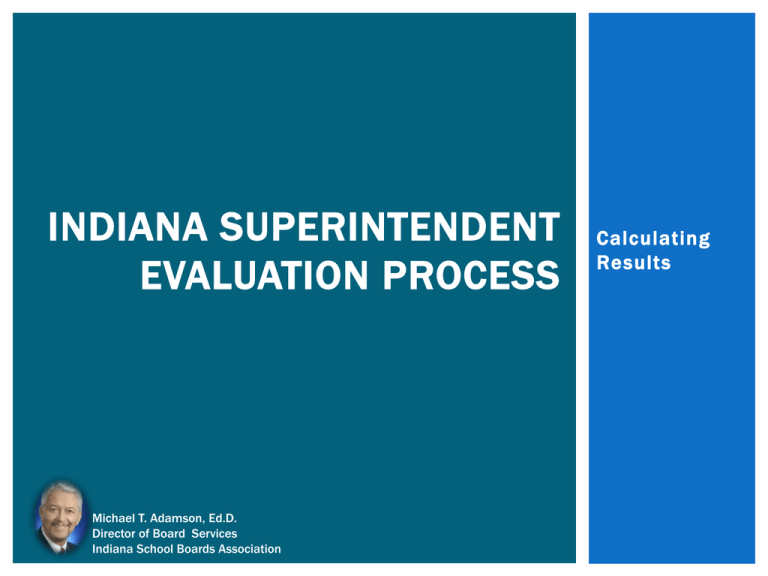
INDIANA SUPERINTENDENT EVALUATION PROCESS Michael T. Adamson, Ed.D. Director of Board Services Indiana School Boards Association Calculating Results WHAT’S THE BIG DEAL? IC 20-28-11.5-4 All certificated employees must be evaluated annually. The evaluation instrument or process must meet the standards of evaluation identified in the statute. 2 THE OPPORTUNIT Y ISBA and IAPSS seized the opportunity to develop an evaluation process that reflects the duties and responsibilities of superintendents throughout Indiana, regardless of school size or administrative staff support. The strength of this process predominantly relies on a mutual understanding between a board and its superintendent regarding the objective requirements of evaluation. 3 DEVELOPMENT OF THE PROCESS Joint committee IAPSS Dr. Tom Little, Jr. – MSD Perry Township Dr. Sherry Grate – DeKalb Central Dr. Scott Hanback – Tippecanoe Dr. Kevin Caress – Clark Pleasant (Exec. Dir. of Central IN Education Ctr.) ISBA Dr. Michael Adamson – Dir. Of Board Services Lisa Tanselle, Esq. – Staff Attorney IDOE - Advisory Dr. Dennis Brooks – Sr. Advisor to IN State Supt. (IEERB Consultant) 4 BOARD RESPONSIBILIT Y School boards are explicitly responsible for annually evaluating their superintendent’s performance. A responsible evaluation is not an informal exercise that mainly relies upon subjective measurements. 5 EVALUATION COMPONENTS The total evaluation ranking is achieved by the combined performance scores of 3 evaluation components: 1. The rubric composite score 2. The composite score for personal/corporate goals 3. The corporation accountability grade 6 WEIGHING THE EVALUATION This instrument can be applied to any school system, regardless of demographics Boards and Superintendents mutually determine the weight of each component prior to the evaluation cycle. 7 METRICS PERCENTAGES The percentages next to each of the three categories is to be determined by the board and superintendent at the beginning of each evaluation period. The joint committee’s recommendation is that the greater weight of the evaluation should always reside with the evaluation instrument. Circumstance and priorities should and will affect these percentages from year-to-year and must be a topic of meaningful discussion before each evaluation period if the process is to represent a formative exercise in continuous improvement. 8 THE METRICS Enter the date the weights were established. This cell fills automatically. Enter the weight to be given to the assessment, e.g. 45 = 45% Enter the weight to be given for the accountability grade, e.g. 30 = 30% This cell fills automatically. Enter the weight to be given to goals/objectives, e.g. 25 = 25% 9 THE RUBRIC Adapted from the Doug Reeves Leadership Matrix Consists of 6 categories with a total of 25 indicators aligned with the Indiana Content Standards for Educators – School Leader – District Level Performance indicators are aligned in categories that define Highly Effective, Effective, Improvement Necessary, and Ineffective performance 10 RUBRIC EXAMPLE 11 RUBRIC PERFORMANCE Superintendents and the School Board should have a mutual understanding of the performance expectations for each indicator and the kinds of objective evidence of performance prior to completing this evaluation. It is an ISBA and IAPSS recommendation that the greater weight of the evaluation be assigned to the superintendent’s rubric indicator performance. 12 INDIVIDUAL SCORE SHEET Every board member should place a check mark in the box that reflects his or her scores for every indicator in each of the six categories of the evaluation rubric. These are the only choices . . . Marks in-between two boxes should not be counted. 13 EVALUATION DATA These cells fill automatically Enter answers next to each indicator for each board member 14 SUPERINTENDENT GOALS May be personal goals or corporate objectives Need a minimum of two Identify goals at the beginning of the evaluation process Define the performance categories, i.e., HE, E, I, IN 15 GOALS/OBJECTIVES These cells fill automatically Enter Number of Goals and/or Objectives Enter Score Based on Scoring Criteria 16 SCHOOL RATING These cells fill automatically Enter Grade provided from IDOE 17 EVALUATION SUMMARY All Cells in this Worksheet Fill Automatically If the Total value of categories in the Metric Worksheet is less or greater than 1.0 (100%), these weight cells will be blank. Every board member should sign the evaluation summary. 18 RANKING ISBA/IAPSS Superintendent Evaluation Metrics 19 FINAL COMMENTS Superintendents should be proactive regarding the evaluation process. The superintendent’s evaluation must be reported along with the evaluations of other certificated employees. If there are questions regarding the process or if additional training is needed for board members, contact ISBA. 20 Questions? 21







